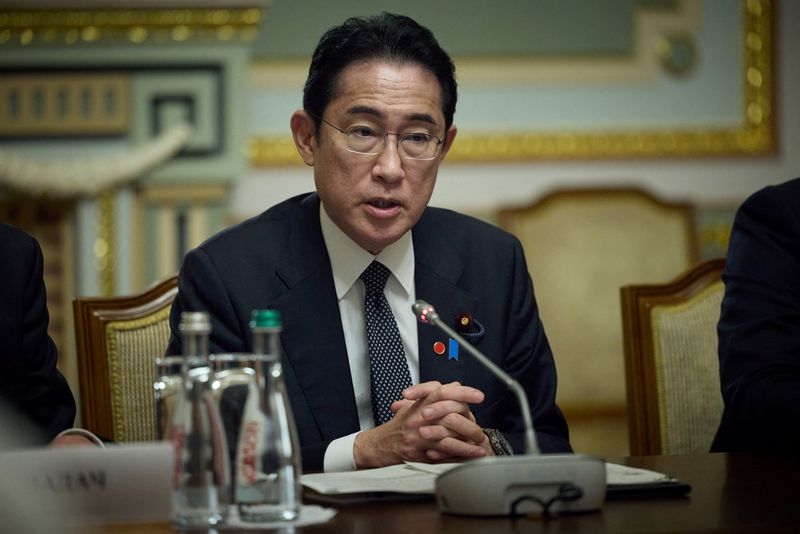
© Reuters. FILE PHOTO: Japan Prime Minister Fumio Kishida meets with Ukraine’s President Volodymyr Zelenskiy, amid Russia’s attack on Ukraine, in Kyiv, Ukraine March 21, 2023. Ukrainian Presidential Press Service/Handout via REUTERS
By Tetsushi Kajimoto and Leika Kihara
TOKYO (Reuters) -Japanese banks’ holdings of Additional Tier-1 (AT1) bonds issued by Credit Suisse are small so the direct hit from them being written down to zero will be limited, Finance Minister Shunichi Suzuki said on Tuesday.
He also said AT1s issued by Japanese banks are not subject to the same conditions that the Credit Suisse notes were, which meant similar wealth destruction was unlikely in Japan.
As part of the rescue of Credit Suisse by its rival UBS, Credit Suisse’s AT1 bonds with a notional value of 16 billion Swiss francs were wiped out, angering some holders of the debt who thought they would be better protected than shareholders.
Suzuki said some companies and wealthy individuals who held Credit Suisse’s AT1 bonds would likely suffer losses but that Japanese financial institutions had sufficient liquidity and capital buffers to weather any losses.
AT1 bonds – a $275 billion sector known as “contingent convertibles” or “CoCo” bonds – can be converted into equity or written off if a bank’s capital level falls below a certain threshold.
“Credit Suisse’s AT1 bonds have a special contract with a clause regarding principal reduction in case it receives government support,” Suzuki told parliament, referring to the state-backed bailout.
Steps taken by Swiss authorities were based on the special contract and carried out to protect clients and maintain financial system stability, he added, noting the Swiss case was an exception.
“Such special contracts are not applied to AT1 bonds of Japanese financial institutions, so there won’t be reduction in principal” in case of government-backed bailouts, Suzuki added.
Suzuki was responding to questions in parliament about the potential impact of the U.S. and European banking-sector woes on Japan’s banking sector, including its mega banks.
His remarks came after Prime Minister Fumio Kishida said on Tuesday he is carefully monitoring developments in Japanese financial institutions in the wake of Western banking problems.
“Risk aversion is seen in underlying financial markets, but Japanese financial institutions have ample liquidity and capital, therefore the financial system remains stable as a whole,” Kishida told a parliament session.





